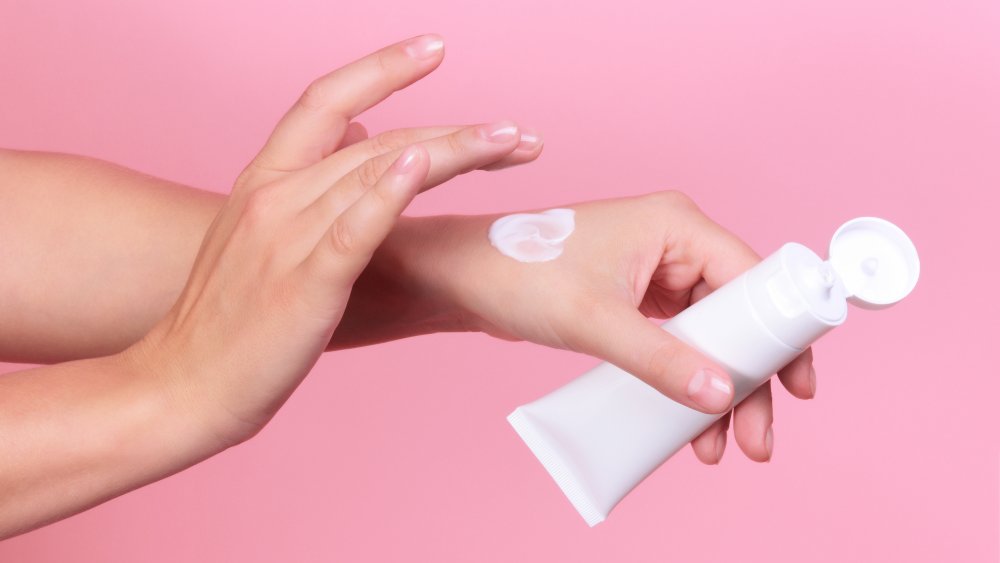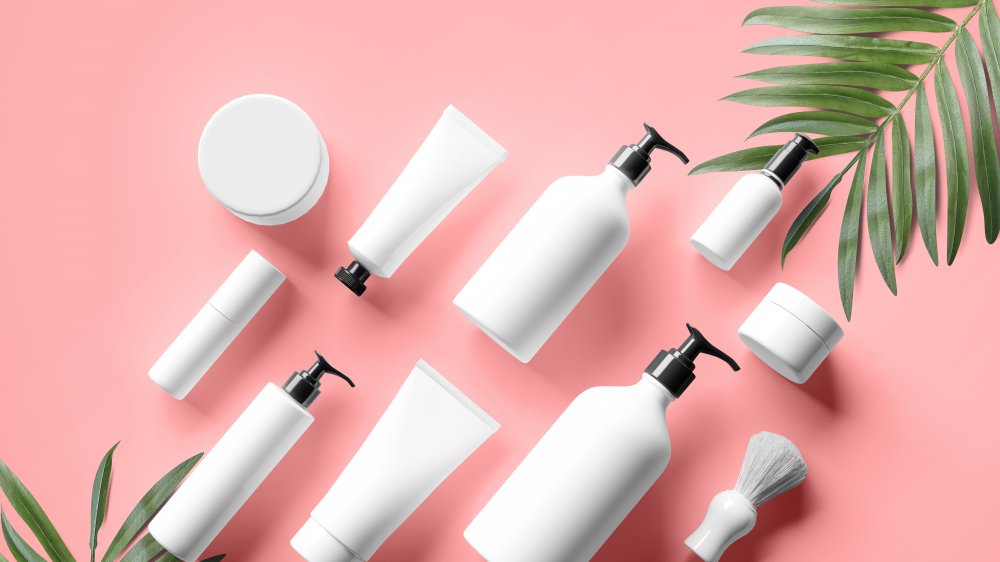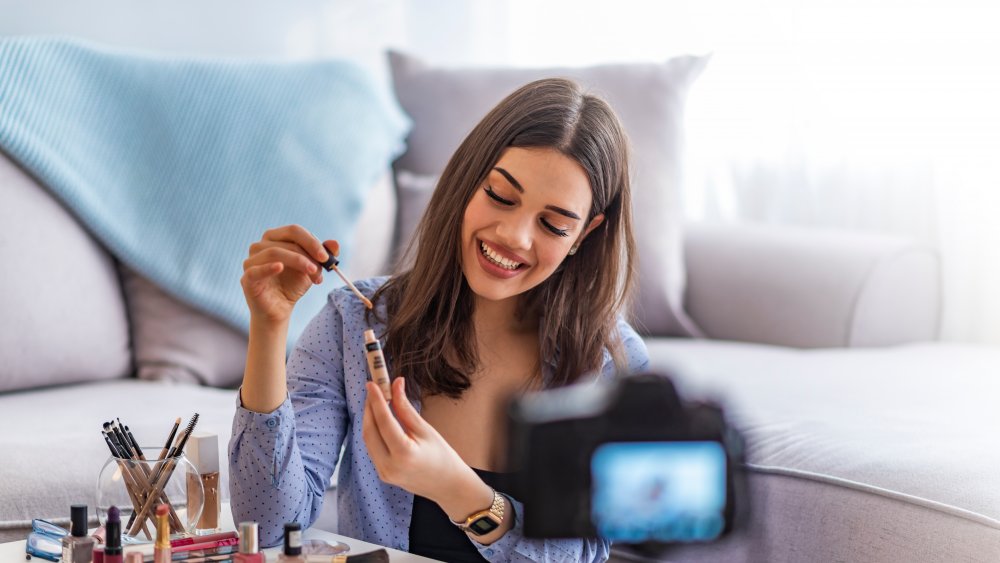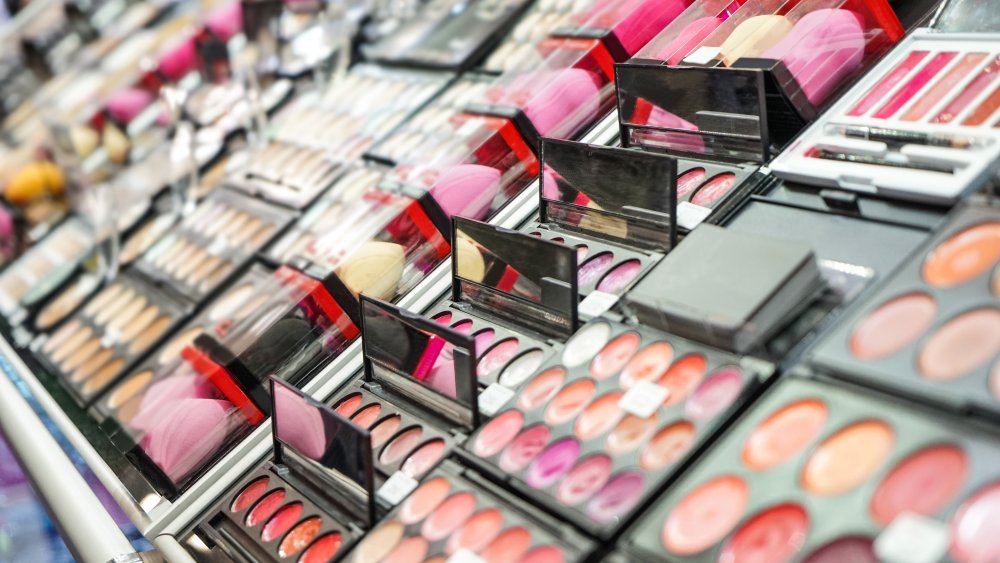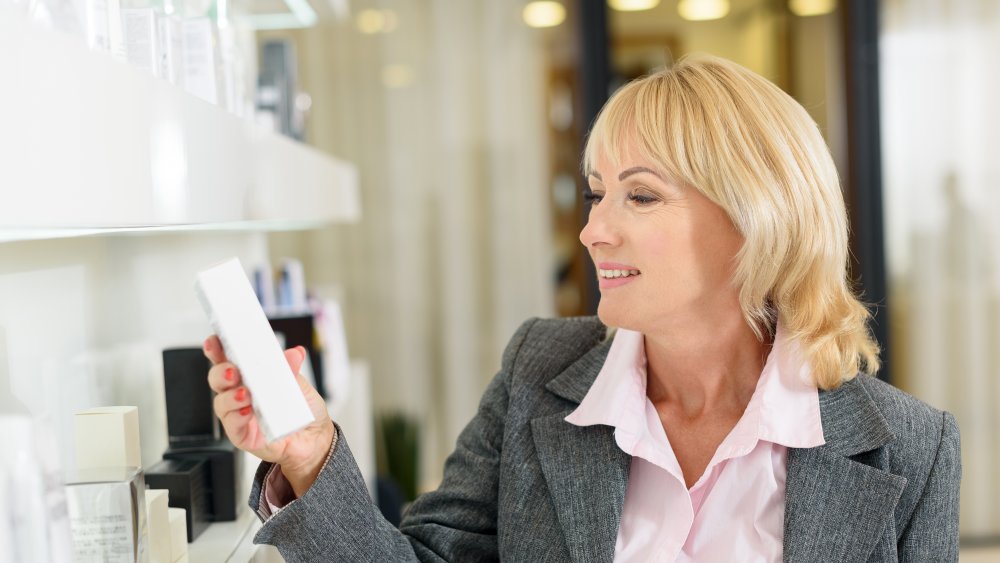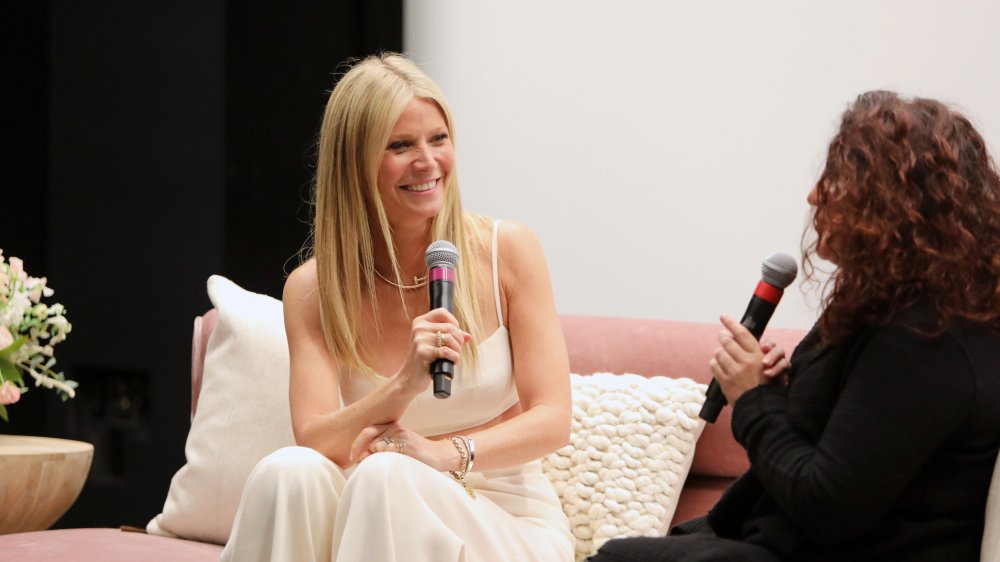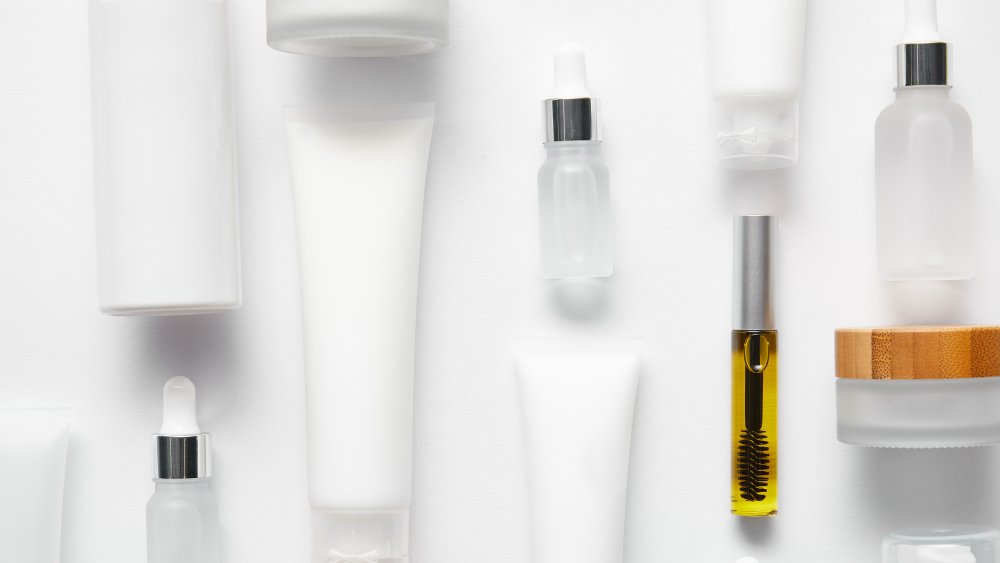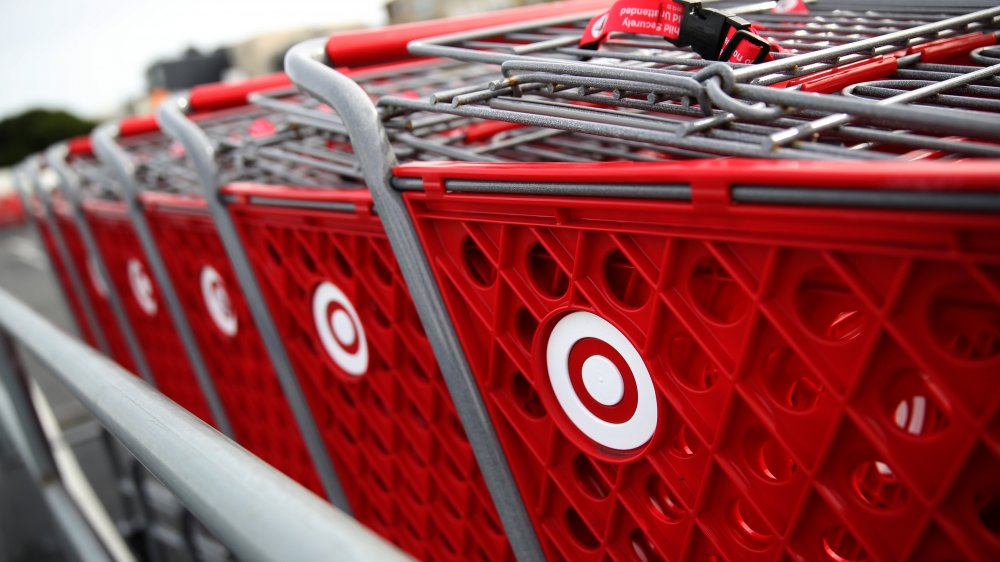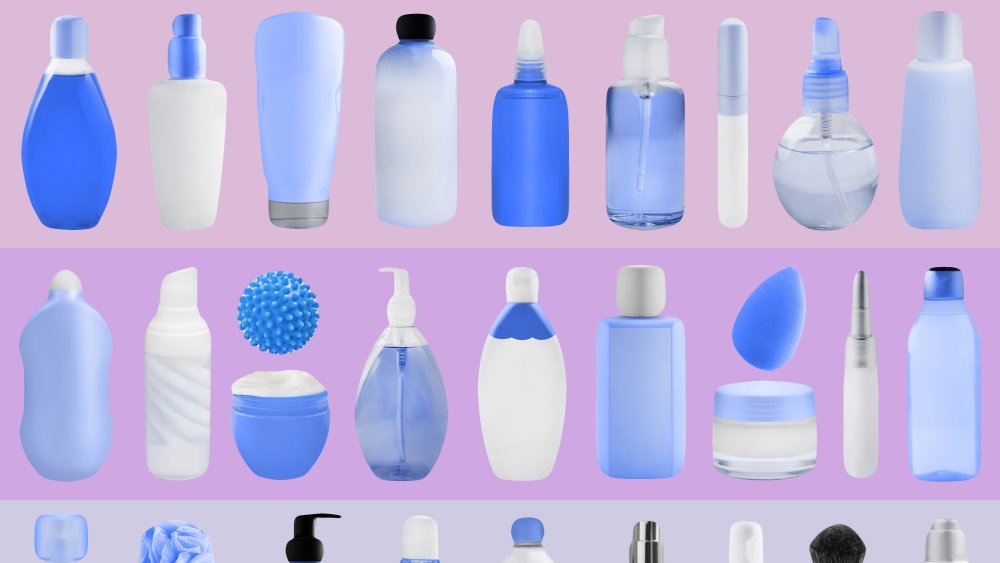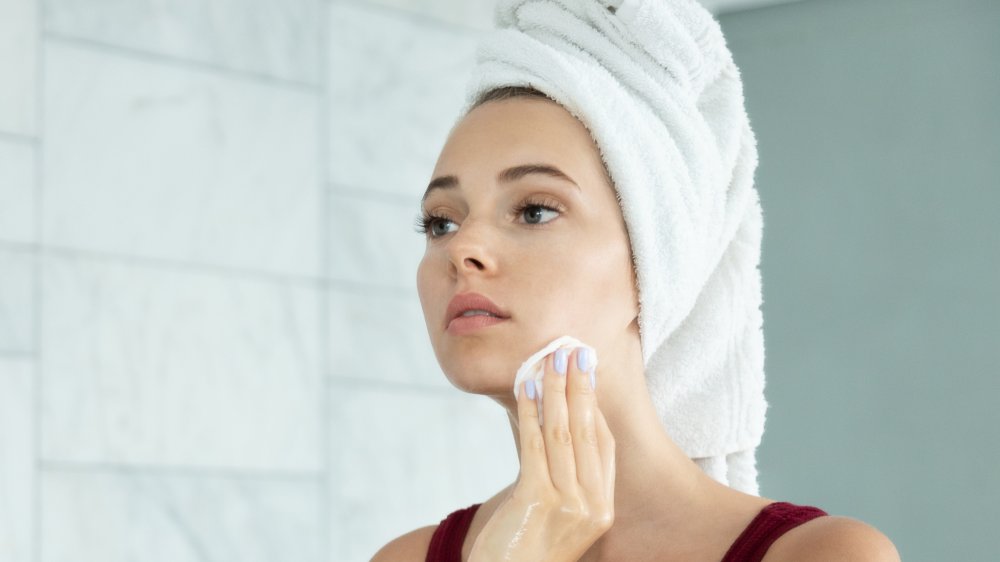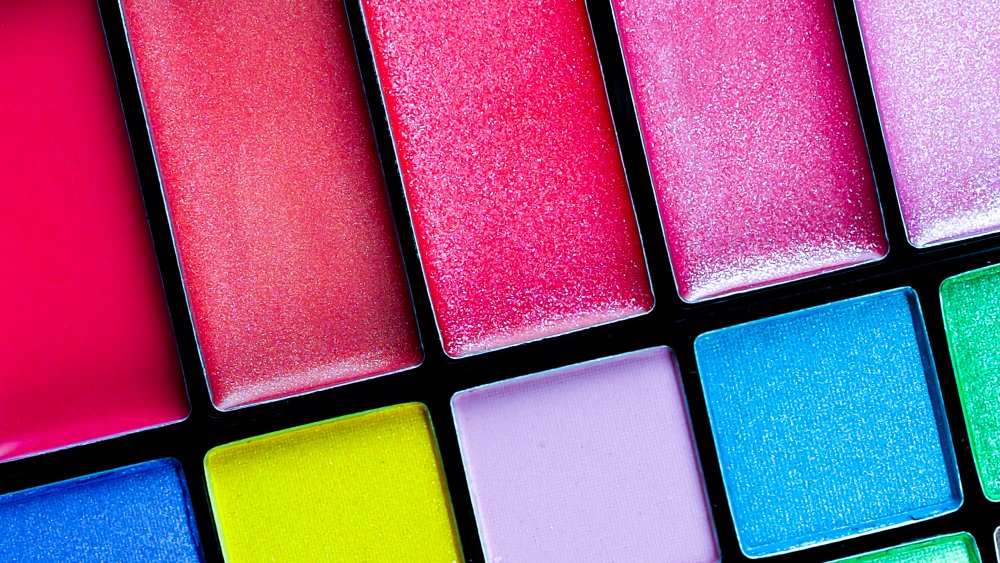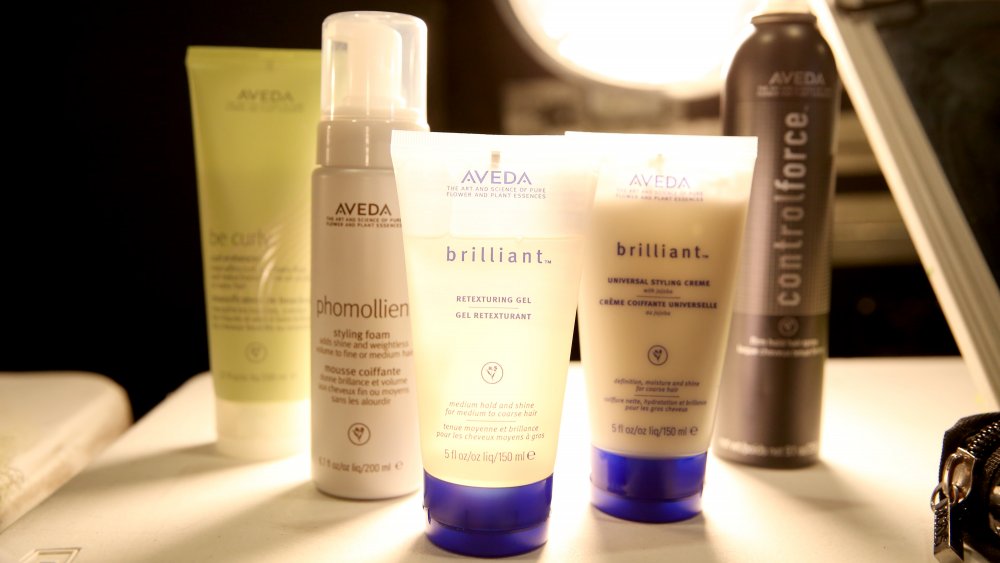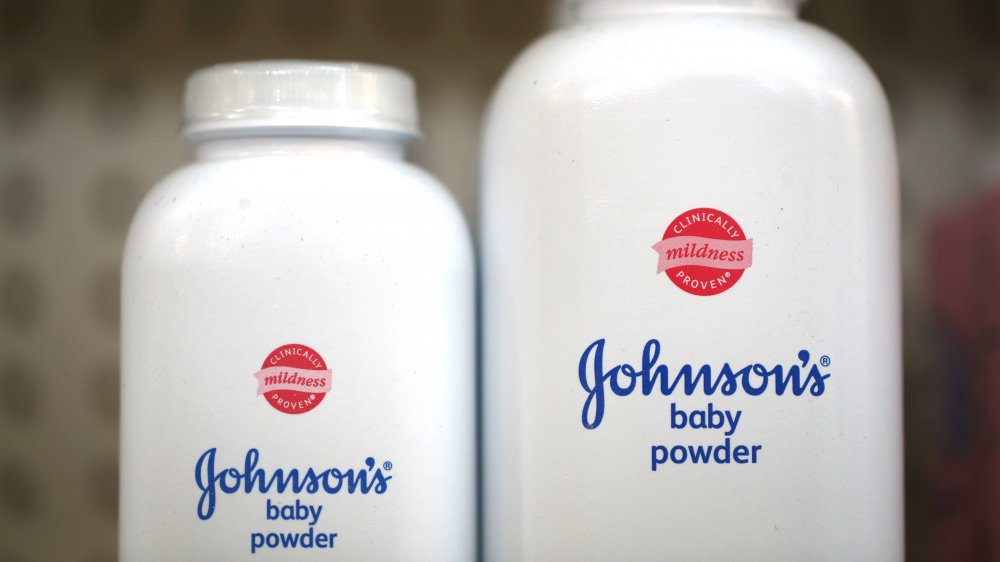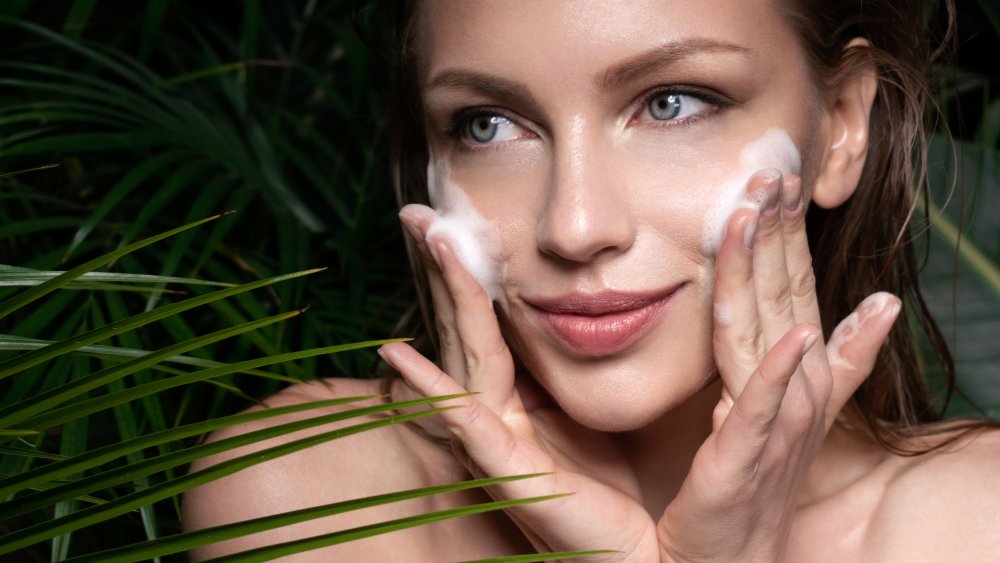The Untold Truth Of Clean Beauty
We may receive a commission on purchases made from links.
Clean beauty is a popular skincare and makeup trend to follow. "Clean" is a term used to describe the state of your clothes, body, and, yes, even your beauty regimen.
From skincare to cosmetics, the beauty industry is changing the way products are made thanks to the #cleanbeauty movement, which exploded over the years with help from Instagram influencers and celebrities like actress and founder of Goop Gwyneth Paltrow. Visit any big-box store or browse Amazon, and you'll find countless product labels with buzzwords like "clean," "natural," and "organic."
To find out just how popular the phenomenon is, Harper's Bazaar polled more than 1,000 U.S. women in 2019, and found that nearly 50 percent of women were already using clean beauty products — and more than 60 percent of women were willing to try. But with the beauty industry being self-regulated, are products that claim to be clean really clean? Here's the dirt on clean beauty.
What does clean beauty really mean?
While its definition tends to vary, most brands and experts consider a product "clean" when it's free of potentially toxic ingredients, whether they're natural or synthetic, like talc and parabens, as noted by Good Housekeeping.
Harper's Bazzar equated clean beauty to clean eating: An individual who consumes processed foods doesn't necessarily gain the nutrients necessary for a healthy body, and the same applies to the products we put on our skin. Speaking with Harper's Bazaar, holistic aesthetician Kristina Holey said, "If you're using conventional beauty products with a ton of preservatives, fragrances and stabilizers, you're going to damage the skin's microflora, which will impair your skin function and have the worst impact for skin quality and appearance."
There currently is no official definition for "clean" as it pertains to the beauty industry, and that's something Kopari chief marketing officer Jeremy Lowenstein said needs to change. He told The Hollywood Reporter, "There is a lot of confusion among consumers on product labeling, from 'green' to 'clean' to 'natural' and more, and a combination of regulations to better define these labels and education surrounding them would be helpful so consumers are able to make more educated choices based on their values."
What's behind the popularity of the clean beauty movement?
Consumers are becoming more intentional with what beauty products they're using, as Victoria Buchanan, senior futures analyst at The Future Laboratory, told British Vogue. "An obsession with wellness and detoxification, both in terms of diet and products, is fuelling a demand for stripped-back, 'clean' ingredients." She explained, "Consumers are becoming more knowledgeable about possible irritations cause by synthetic ingredients in fragrances and preservatives and are reading labels more carefully..."
This clean beauty obsession may be fueled by celebrities like Gwyneth Paltrow, the founder of Goop, and Jessica Alba, the founder of The Honest Company, who've both publicly praised clean living through their lifestyle brands.
Another factor, according to Mind Body Green, is the rise in sensitive skin conditions. According to Frontiers in Medicine, 60 to 70 percent of women and 50 to 60 percent of men have reported having some degree of sensitive skin. Why so many? It's possible people are "sensitizing" their skin with the use of too many products, dermatologist Whitney Bowe, M.D., told Mind Body Green. "It's a tricky balance: You want to remove dead skin cells so you get a nice glow but don't want to do it too much and thin out that layer," Bowe said.
What it takes for products to fall under the clean beauty branch
The American beauty industry is self-regulated, which means brands can claim their products are considered "clean beauty" without inspection, and, according to Harper's Bazaar, cosmetic regulations in the United States are more than 80 years old, as the last federal regulation for safe products passed in 1938. As a result, the U.S. is lagging behind other countries, the Environmental Working Group reported. A 2019 news release from EWG stated that more than 40 nations, including Germany and the United Kingdom, "have enacted regulations specifically targeting the safety and ingredients of cosmetics and personal care products." Many of those countries have "restricted" or "banned" over 1,400 chemicals from beauty products. By contrast, the U.S. "has only banned or restricted 11 chemicals from cosmetics," according to Campaign for Safe Cosmetics.
Under current regulations, Lauren Sucher, a press officer for the U.S. Food and Drug Administration, told Today that the FDA has no authority to recall toxic beauty products and that the manufacturer would need to volunteer to do so. Sucher noted, "We can only take action within our legal authority, our limited information and our limited resources."
This is how to determine if a product counts as clean beauty
It can prove difficult to determine how clean a product really is. Luckily, there are some third-party certification bodies like ECOCERT and EWG, which "brands can pay to have their products put through rigorous testing to make sure they are free of chemicals and toxins," according to a CNN report.
"Not only does ECOCERT regulate ingredients, but we must also comply with their sustainability and environmental standards in every aspect of manufacturing — from our equipment to our packaging, recycling program and the cleaning products we use in our facility," One Love Organics founder Suzanne LeRoux told CNN. But not all brands use a form of certification for clean beauty, the report stated, even though its products may be considered clean. So one of the best ways to ensure your product is clean is by reading the ingredients.
According to Harper's Bazaar, products claiming to be formulated with "clean" ingredients should never have parabens, fragrances, aluminum compounds, formaldehyde, silica, or refined petroleum, among others.
Women behind the clean beauty industry have pushed for transparency
Women are behind many of the brands trying to clean up the beauty industry.
Avengers: Endgame star Gwyneth Paltrow was arguably ahead of the trend when she launched her lifestyle brand Goop in 2008, which sells clean beauty products. Also a published author, Paltrow used her platform to call out the beauty industry. In her 2016 book Goop Clean Beauty, she wrote in the foreword, "At GOOP, we find it ironic that many of the U.S.'s biggest beauty companies use ingredients that are known to be harmful and then set up foundations and charities to support breast, cervical, and ovarian cancer research. To do our part, we fill the shelves ... with products from companies that are doing better by all of us."
Then there's the women behind Crunchi, a makeup and skincare company founded in 2016. Founders Melanie Petschke and Kelly Weston said they wanted to offer truly clean products safe for our bodies and the environment, according to a Forbes interview. "Women deserve clean cosmetics from a transparent company they can trust. Each decision we make is based on our core values of integrity and transparency," Weston said.
The switch to clean beauty may come at a price
Knowledge is power, but, when that knowledge comes at a price, it could make it difficult for people to make the switch.
Clean beauty products from popular brands "typically cost more than $40, and treatment formulas can hit triple digits," according to Allure. Unfortunately that means consumers with lower incomes may not have an option when it comes to what ingredients they're using. So what makes clean beauty products so expensive? Speaking to Allure, Tara Foley, the founder and CEO of clean beauty company Follain, said, "Some of our brands take the extra step of having their products certified ECOCERT or USDA Organic, lengthy and expensive processes that increase the cost of the product."
Amy Galper, cofounder of the New York Institute of Aromatic Studies, told Allure, "In today's clean beauty crush, people know that they can ask a high price and get away with it." However, she added, "But we're starting to see a response to that."
Retail stores have affordability in mind when it comes to clean beauty
Big names in the retail world like Target and Walmart are working hard to make clean products accessible to all, as noted by Mind Body Green.
In 2019, Target launched its clean beauty collection Versed, currently available online and at stores nationwide. Items in the collection, which includes everything from facial cleansers to moisturizers, range from $5 to about $25. Walmart also has its own skincare brand called Earth to Skin, which is also available online and at stores and products are $10 or less.
Beauty retailer Sephora went a step further and created the Clean at Sephora initiative in which the beauty brand badged over 2,000 products as "clean," according to Mind Body Green. "Sephora is seen as a leader in identifying clean beauty brands and products," said Christine Chang, co-founder and co-CEO of skincare company Glow Recipe. "Clean beauty has been around for a while, and every brand and retailer has a different definition of it, but Sephora definitely made it more official." Products range from as little as a few bucks to hundreds of dollars.
Clean beauty comes in all shapes and sizes
From skincare to hair, clean beauty products come in all shapes and sizes. Beauty expert Bobbie Thomas shared on Today the best clean beauty products and brands — and many of them are available for purchase at major retailers.
Physician's Formula is apparently at the forefront of the clean beauty makeup movement. Physician's sells many of its products at Walmart, including its tinted lip treatment. If you're looking for clean beauty body care, you can find that in the form of Renpure's lavender and honey body wash at Amazon and Walmart. According to Today, Renpure "creates plant-based beauty products that are free from sulfates, parabens, dyes and more." Furthermore, even nail polishes can be considered clean beauty products, such as Sally Hansen's vegan nail polish, available in 30 colors at Target.
"There are a lot of great brands making clean beauty products," said Thomas. However, she noted that consumers still need to be cautious when it comes to choosing legitimate products.
Clean beauty may be better for your skin
According to some dermatologists and cosmetic chemists, clean beauty products may be better for your skin.
"From my unique vantage point as a facialist for the past 25 years, having treated over 25,000 faces, I have seen how the proliferation of harsh ingredients — including dimethicone, fragrance, colorants, and sulfates — compromise the skin's lipid barrier, thereby sensitizing the skin," Angela Caglia, a celebrity aesthetician told The Zoe Report. Cosmetic scientist Dr. Shuting Hu, Ph.D., who has worked with clean beauty company Acaderma, agreed with Caglia, telling The Zoe Report, "I personally believe in using clean ingredients as it is the very best way to prevent skin irritation and skin barrier damages, both of which are better for skin health." She added, "Not only is it my belief, it is also scientifically proven."
But Hu added, "clean" isn't synonymous with "natural." Hu said, "Plenty of natural ingredients are irritating, and not all natural materials are made equally," adding, "Some high quality synthesized ingredients are also clean, like vitamin C."
Clean beauty cosmetics competes with color
"Out with the old, in with the new" is an adage clean makeup brands are taking to heart. Many are moving away from nude shades and instead opting for color for everything from lipstick to blush, rivaling other popular brands. "Clean beauty brands are now leveling the playing field. By achieving amazing color pay-off and luxury product performance, we are now competing with long-established conventional brands and are less and less relegated to the eco-sideshow," Vapour co-founder Kristine Keheley told Mind Body Green.
And that rivalry is growing as more consumers switch over to clean beauty products. "The space is expanding because today's consumer is more savvy. New standards are being set," beauty company Kosas founder Sheena Yaitanes told Mind Body Green. For example, Honest Beauty by Jessica Alba has a vegan, matte liquid lipstick that comes in eight bright colors. And cosmetics brand Kosas released a "water-based" ten-second liquid eyeshadow with a collection of bright hues, including cobalt blue.
Iconic brands have joined the clean beauty movement
Many longtime beauty brands are finding value in the clean beauty market.
That includes hairstylist Frederic Fekkai, who owns his namesake brand and launched a natural collection: The One by Frederic Fekkai The Pure collection. He told Mind Body Green that what we put on our hair is just as important as what we eat. "I believe today, more than ever, we have access to and can produce and formulate products with natural and powerful ingredients. Historically, natural ingredients were more difficult to source and were more expensive to infuse into products. These ingredients are more accessible today," Fekkai said.
Then there's cosmetics brand Aveda, which reintroduced its Aveda Sap Moss collection after a hiatus. "The product was last sold in the '90s, and ever since then, Aveda fans have requested that the products make a comeback," said Aveda's vice president of research and development hair care, Christine Hall. "It was discontinued for a few reasons, such as changing mission requirements and ingredient availability." The collection is now free from silicones, parabens, gluten, mineral oil, and petrolatum, according to its website.
This clean beauty documentary showed the dangers of using non-clean products
A documentary by director Phyllis Ellis, Toxic Beauty looks at the unregulated beauty industry and the dangers behind it. With interviews from scientists, cancer survivors, and families of people who've lost their lives, the film primarily focuses on talc, a mineral found in baby powder that may cause cancer, as reported by The Hollywood Reporter. In 2018, according to USA Today, about $4.7 billion in total damages was awarded "to 22 women and their families after they claimed asbestos in Johnson & Johnson talcum powder contributed to their ovarian cancer..." A rep for Johnson & Johnson told The Hollywood Reporter its products are "safe."
"[It's] something that you don't believe," filmmaker Ellis told The Hollywood Reporter about the beauty industry in general. "When I first started pitching the film to get money, people were like, 'You know, it can't be that bad.' Actually it is that bad... We have no idea what's in the products we're using. That was really alarming."
Ellis said she doesn't believe companies intend to hurt people. However, Ellis noted, "We have to shift just like they did with the tobacco industry. We have to care." So, clean beauty may just be the way to go to avoid potentially negative effects from makeup and skincare products.
Clean beauty is not just a trend
A 2019 report from Grand View Research, Inc. predicted that the global organic personal care industry will reach nearly $25 billion by 2025. And as the industry and the clean beauty movement continue to grow, so will the demand for ingredient transparency, according to CB Insights. A report stated, "Ingredient transparency has become a top priority not only for beauty and personal care brands, but also for CPG [Consumer Packaged Goods] and retail companies more broadly."
Clean beauty is more than just a trend. Beauty brand Kopari's Jeremy Lowenstein told The Hollywood Reporter, "The clean beauty movement is growing at such a fast rate year-over-year, proving that clean beauty is not just a trend but the way of the future. In 2020, we are expecting and hoping to see more transparency from brands, from the ingredients used in their products to where they source them and more."
With the California Cruelty-Free Cosmetics Act, which went into effect in 2020 and bans cosmetics tested on animals, as noted by PETA, a more transparent future may be closer than we think.
